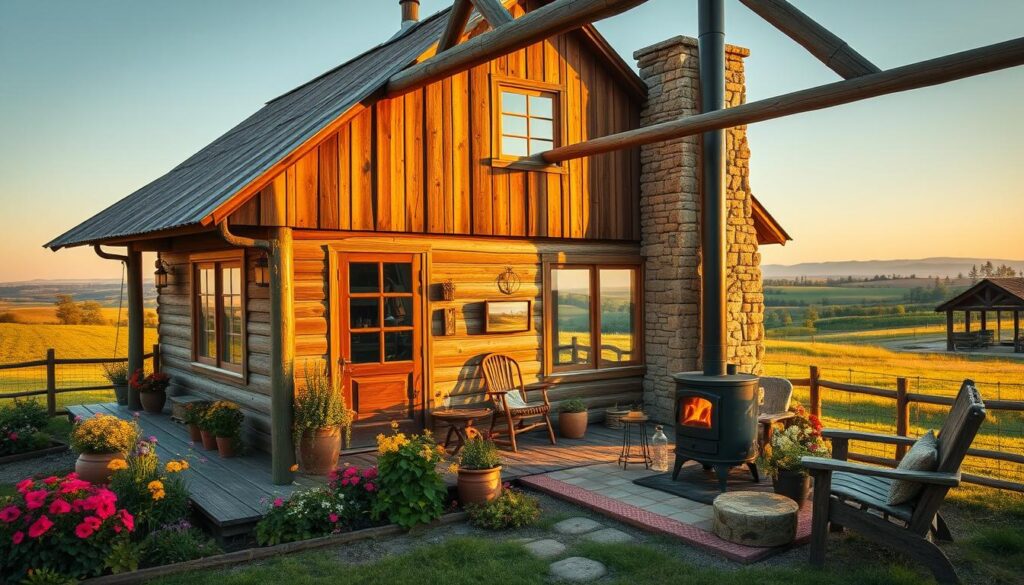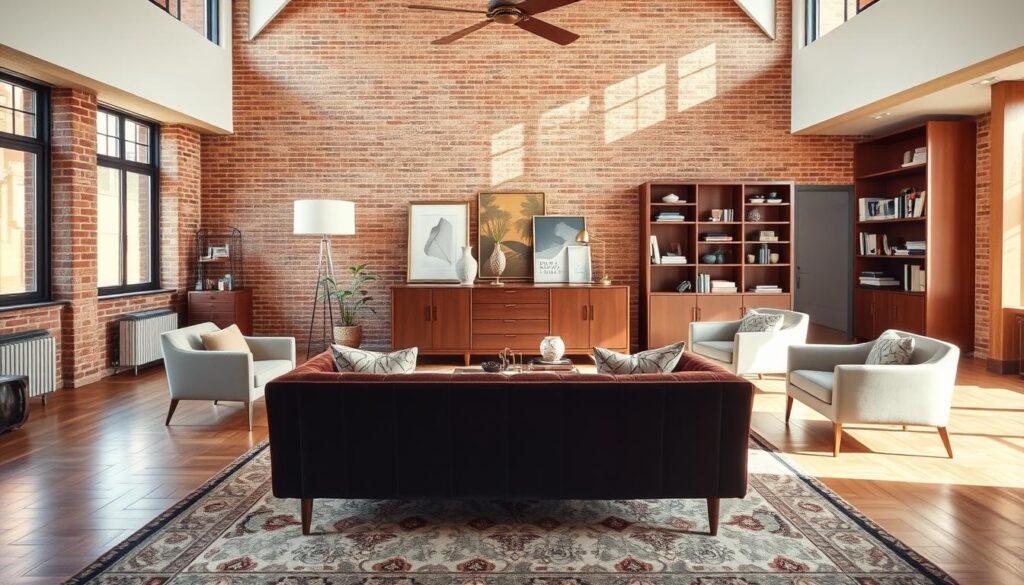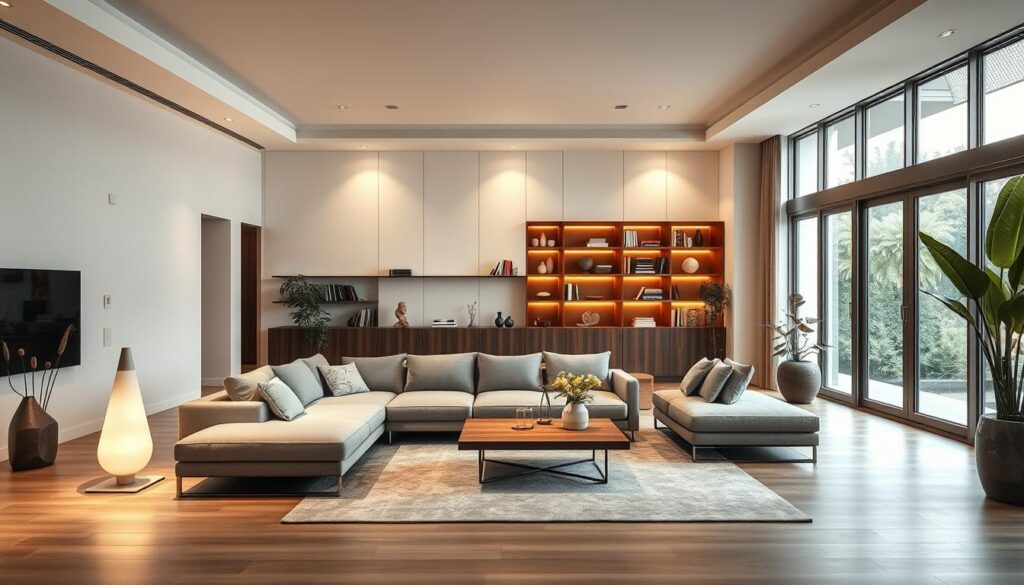Did you know the right interior design style can change your living space? It makes it more useful and looks better. With so many design options, picking the perfect one can be hard.
We’ll look at the top modern home décor trends and classic interior styles. We’ll help you find the best match for your unique space. Whether you like sleek and modern or traditional and eclectic, we’ll show you how to choose a style that shows who you are and what you need.
Key Takeaways
- Understanding the different interior design styles
- Identifying your personal style and preferences
- Exploring the characteristics of various design styles
- Learning how to mix and match elements to create a unique look
- Discovering the latest modern home décor trends
Understanding Interior Home Styles
Interior home styles are more than looks; they make your living space feel like home. The design of a home’s interior affects its feel and comfort. It’s all about creating a space that fits your lifestyle.
What Are Interior Home Styles?
Interior home styles are unique looks and functions that make a home special. They range from classic interior design to traditional home decoration. Knowing these styles helps homeowners choose the right look for their home.
Importance of Choosing the Right Style
Choosing the right style is key because it shows who you are and makes your home cozy. Decorilla says knowing the differences between styles is crucial. The right style makes your home more functional and enjoyable.
The style you pick also changes how your home feels. For example, traditional home decoration makes a space warm and inviting. Modern styles bring a sleek, contemporary vibe. So, pick a style that matches your taste and your home’s design.
Popular Interior Home Styles in the U.S.
Looking at the most popular interior home styles in the U.S. shows a wide range of design choices. The country’s varied architecture is seen in its interior designs. Different styles have become more popular over time.
Traditional
The traditional style is known for classic furniture, detailed designs, and warm colors. It brings a cozy and familiar feel, making it a favorite among homeowners. Traditional homes often have rich wood, intricate patterns, and decorative touches.
Modern
Modern design focuses on simple lines, less decoration, and function. It suits those who like minimalist interiors and smooth surfaces. Modern homes use the latest tech and new materials.
Farmhouse
Farmhouse style has become very popular, offering a cozy and welcoming vibe. It features rustic elements, old decor, and a simple color scheme. Common features include exposed beams, shiplap, and vintage items.
Industrial
Industrial style is loved for its look of old factories and warehouses. It has exposed brick, metal beams, and old wood. This style is great for those wanting a unique, urban feel.
In summary, the U.S. has many interior design styles, each with its own traits. Knowing these styles helps homeowners pick the right look for their homes.
How to Choose an Interior Style for Your Home
Choosing an interior style that shows who you are and fits your home is a journey. It starts with thinking about what you like and how you live. It’s about finding a style that matches your personality and lifestyle.
Assessing Your Space
Look at your home’s architecture, natural light, and room flow. For example, a bright home looks great with light colors. A dim home might be perfect for rustic home designs that feel cozy and warm.
First, notice your home’s features like cabinets, floors, and special parts. These can guide your design choices. For instance, hardwood floors might lead you to pick furniture that matches their look and feel.
Considering Your Lifestyle
Your lifestyle affects the best interior style for your home. Busy homes with kids or pets need durable, easy-to-clean stuff. If you’re alone or work from home, you might want a calm, productive space.
Think about what you love and what feels like home. You might like eclectic home styling, mixing styles to show your unique taste. The goal is to find common themes that bring your space together, even if your tastes vary.
| Lifestyle Factor | Design Consideration | Style Impact |
|---|---|---|
| Busy Household | Durable Materials | Practical yet stylish choices |
| Working from Home | Quiet, Organized Space | Minimalist or calming designs |
| Entertaining Guests | Spacious Layout | Open-plan living areas |
For expert help in making your interior style come to life, talk to interior design pros. Check out services like https://oumaatelier.com/services/ for personalized advice.
The Elements of Traditional Home Style
The traditional home style is known for its detailed decor and classic furniture. It makes any room feel warm and welcoming. This style focuses on symmetry, classic shapes, and lots of ornamentation.
Furniture Choices
Traditional homes often have furniture with intricate carvings and ornate details. Dark woods like mahogany and walnut are popular, adding luxury. Choose furniture with classic shapes and comfy upholstery for a cozy feel.
- Louis XVI armchairs with carved wooden frames
- Velvet sofas in rich jewel tones
- Ornate wooden coffee tables with intricate inlays
Color Palette
The traditional color palette includes warm, rich tones and soft, muted hues. You’ll see deep reds, blues, and greens alongside creamy whites and soft grays. These colors create a balanced and harmonious atmosphere.
- Warm beige or cream for walls
- Rich wood tones for furniture
- Deep jewel tones for accent pieces
Decorative Accents
Decorative accents are key in traditional home style, adding texture and interest. Use silk, velvet, and damask fabrics in upholstery, drapery, and throw pillows for depth. Ornate metalwork, carved wood, and antique items also enhance the traditional look.
- Silk drapery with heavy tassels
- Velvet throw pillows in rich colors
- Antique vases and decorative accessories
Embracing Modern Interior Design
Modern interior design is more than just looks. It’s about making a space that’s both beautiful and practical. This style focuses on simplicity, clean lines, and function. It’s perfect for those who want their home to look good and work well.
Key Characteristics
Modern design stands out with its simplicity and use of industrial materials. It’s known for:
- Clean lines and minimal decor
- An emphasis on functionality
- Use of industrial materials like metal and glass
- A focus on simplicity and negative space
This style creates a sleek, modern look. Modern homes are often open and airy, thanks to the focus on space and simplicity.
Popular Materials
The choice of materials is key in modern design. Popular picks include:
| Material | Characteristics | Common Uses |
|---|---|---|
| Metal | Industrial look, durable | Furniture frames, lighting fixtures |
| Glass | Transparent, versatile | Tables, shelves, decorative accents |
| Chrome | Modern appearance, easy to clean | Lighting fixtures, hardware |
Decorilla says modern designs often use these materials for a sleek look.
Understanding modern design’s key traits and materials helps homeowners create stylish, functional spaces. Whether updating a room or the whole house, modern design offers a sophisticated look that improves any space.
The Allure of the Farmhouse Aesthetic
Farmhouse style is more than a trend; it’s a way to make your home welcoming. It mixes the simplicity of rural life with vintage charm. This makes it a favorite among homeowners.
The farmhouse look uses natural materials like reclaimed wood and stone. It also includes vintage decor. These elements add warmth and coziness, giving your home a sense of history.
Rustic Elements
Rustic elements are key in farmhouse style. These include:
- Reclaimed wood for furniture and flooring
- Vintage decor, like old doors and windows
- Natural textiles, like linen and cotton
For more insights on incorporating farmhouse style into your home, visit Architectural Digest’s guide to Farmhouse Style.

Cozy Accents
Cozy accents make a farmhouse feel like home. These include:
- Soft lighting, like table lamps and candles
- Plush textiles, like throw blankets and rugs
- Warm color palettes, featuring earthy tones
To achieve a balanced look, it’s essential to combine these elements thoughtfully. Here’s a simple comparison of different design elements:
| Design Element | Farmhouse Style | Modern Style |
|---|---|---|
| Materials | Reclaimed wood, natural stone | Steel, glass, concrete |
| Color Palette | Earthy tones, whites, creams | Monochromatic, bold colors |
| Lighting | Soft, warm lighting | Bright, sleek lighting |
By understanding the key elements of farmhouse style and how to balance them, you can create a warm and inviting home. It will feel both authentic and cozy.
Industrial Style: A Trendy Option
Industrial style is a big hit in modern homes, mixing cool and eclectic vibes. It’s all about using raw materials and keeping decor simple.
This style isn’t just about looks; it’s also about making spaces work well. Exposed brick and metal beams give homes a modern, tough feel.
Key Features
Industrial style stands out with exposed ductwork, concrete floors, and metal touches. These elements make a space look both bold and classy.
- Exposed brick walls and metal beams add a touch of industrial chic to any room.
- Concrete floors and minimalist decor contribute to the style’s raw, unfinished look.
- Metal accents, such as steel lighting fixtures, enhance the industrial aesthetic.
Best Locations for Industrial Style
Loft conversions and urban homes are perfect for industrial style. They often have features like exposed brick and metal beams. But, this style can fit many spaces with the right design.
To balance the industrial vibe, add warmth and coziness. For example, area rugs and comfy furniture can make the space feel inviting.
Mixing and Matching Styles
Mixing interior styles can make your home feel truly yours. It lets you show off your unique taste. This way, your home becomes a reflection of your personality.
When to Blend Two Styles
Blending styles adds depth and character to your home. But, knowing when to mix styles is key. For example, combining classic interior design with a modern twist can be timeless yet fresh. This is done by picking a main style and adding bits from another to spice things up.
Consider the room’s purpose when mixing styles. A traditional look might fit a formal living room. But, a modern style could be perfect for a family room or kitchen.
Tips for a Cohesive Look
To keep your mixed styles looking good together, follow these tips:
- Find a common thread, like a color scheme or texture, to link the styles.
- Balance bold pieces with simpler ones to avoid too much.
- Make sure all pieces are in scale and proportion to look good together.
Here’s how you can mix styles well:
| Style Combination | Dominant Element | Secondary Element |
|---|---|---|
| Traditional + Modern | Classic furniture | Modern art pieces |
| Farmhouse + Industrial | Rustic wooden furniture | Industrial lighting fixtures |
By carefully mixing styles, you can make a home that’s both unique and welcoming. It shows off your personal style.

Sustainability in Interior Home Styles
The future of interior design is all about being green. We want our homes to look good and help the planet. Using eco-friendly elements in our homes is now a top priority.
Choosing eco-friendly materials is key in sustainable design. This means picking materials that are recycled, recyclable, or come from sustainable sources. For example, using reclaimed wood, bamboo, and paints with low VOCs is popular for reducing environmental impact.
Eco-Friendly Materials
Think about the environmental cost when picking materials for your home. Going for materials that are sustainably sourced or have less environmental impact can cut down your home’s carbon footprint. For instance, using reclaimed wood for furniture or flooring adds character and reduces the need for new lumber.
Experts say “biophilic design” focuses on connecting with nature. It includes things like plant walls and green roofs. This not only makes your home look better but also makes it healthier.
“The way we design our homes can significantly impact our well-being and the health of the planet.”
Designing with Nature in Mind
Designing with nature means more than just using green materials. It’s about making your home and nature work together. This can be done by adding elements like large windows for natural light or using colors inspired by nature.
For more tips on sustainable interior design, check out DDA Canada’s article on sustainable interior design. It offers great advice on making your home greener.
By choosing sustainable design, we can make homes that are beautiful, comfy, and good for the planet. As we learn more about living sustainably, the future of modern home décor will focus on minimalist interiors. These will be simple, functional, and eco-friendly.
Final Touches: Accessories that Enhance Style
Choosing the right accessories can really make our home stand out. Artwork, lighting, and textiles can take our space to the next level. They help create a look that shows off our personality. In eclectic home styling, mixing vintage and modern items is key, focusing on texture and pattern.
Adding Personality with Artwork
Artwork is a fantastic way to add a personal touch. Pick pieces that match your home’s style and era. For rustic homes, vintage or nature-inspired art works best.
Lighting Choices that Make a Statement
Lighting greatly affects our home’s feel. From sleek pendant lights to classic chandeliers, the right choice can boost our home’s style. Layering different lights can make our space warm and welcoming.
Area Rugs and Textiles that Tie it All Together
Area rugs and textiles are crucial in pulling our home’s style together. They bring warmth, texture, and pattern. When picking rugs and textiles, match them to your home’s color and style for a unified look.


